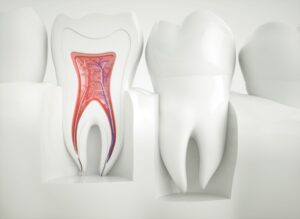
If you’ve had a persistent toothache or have a severely decayed tooth, you may need a root canal to address it. Although you want to fix the problem, it’s natural to hesitate to schedule a procedure if you’re worried it will be long and agonizing.
Fortunately, this treatment typically alleviates more pain than it causes, so you can set your mind at ease. After your appointment, however, taking care of yourself is essential so your mouth can mend. Continue reading to learn more about what to anticipate while you heal!
What is a Root Canal?
This procedure allows your dentist to protect and preserve your natural tooth when it might otherwise require extraction and replacement. If it has a severe cavity or is injured, bacteria can penetrate the tender pulp inside, causing the infection behind the pain.
To alleviate it, your dentist will create a small opening in the affected tooth so they can remove the damaged materials. Then, they’ll sanitize your pearly white before sealing it back up to keep germs out. Finally, they’ll fit you with a dental crown or other appropriate restoration so you can continue using it to eat and speak.
Does Root Canal Recovery Hurt?
Many patients want to know what to expect when recovering from their procedure so that they can be prepared in advance. During the procedure, you’ll be numbed to remain comfortable and relaxed. It can take a few hours for this medication to wear off, and then it’s normal to experience some mild to moderate aches and inflammation. Thankfully, this usually dissipates over the next 24 to 48 hours until it completely fades.
How Can I Recover Effectively After My Root Canal?
To avoid developing any complications, you should follow your dentist’s post-op orders in detail. Common instructions often include:
- Stick to soft foods for a few days that won’t irritate your gums or require excessive chewing.
- Avoid strenuous exercise or activities that can elevate your heart rate or blood pressure.
- Get plenty of rest and drink lots of water to boost your immune system.
- Try to eat on the side of your mouth that didn’t have the procedure.
- Take medications, like antibiotics or painkillers, as prescribed.
- Avoid brushing it right away and rinse with saltwater instead.
If you continue to have a toothache that doesn’t fade or worsens after your procedure, you should contact your provider immediately. They may need to see you again to ensure the procedure was successful and that you mend as intended.
About the Practice
At Smile More Dentistry, you benefit from a team of dentists who work together to offer a full range of services conveniently under one roof. With decades of combined experience, they can handle everything from basic preventative care to more complex procedures, including root canals. Their family-friendly environment is equipped with state-of-the-art equipment, so you know you’re always getting the most current treatment options. They understand that you have a full schedule and offer evening and Saturday appointments, so you can book your visit at a time that works best for you. If you have a toothache that needs to be addressed, you can contact the office on the website or call (845) 675-1512.

